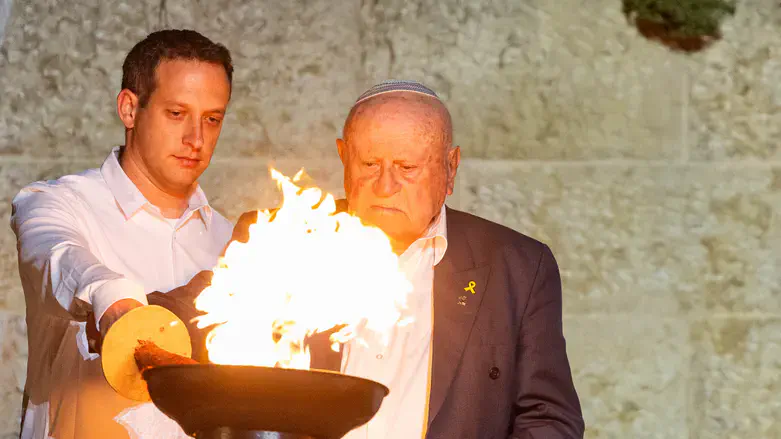
Arie Reiter, who survived the Holocaust in Romania as a child, lit a torch yesterday (Wednesday) at the state ceremony marking Holocaust and Heroism Remembrance Day at the Yad Vashem Museum in Jerusalem. "It was very emotional," Arie told Kan.
Arie was born in the town of Vaslui in Romania in 1929, the eldest son of a religious Hasidic family. He recounts that in Romania, Hitler's racial doctrine was adopted, and laws against Jews began to be enacted as early as 1936. He describes how in his childhood, schools were closed to Jews, laws were enacted that prohibited Jewish lawyers from appearing before the court, and Jews could not travel by train or shop at certain hours. "The laws came one by one," he recalls. "We had a restaurant, and there was a law that we could not sell wine. Without that, we would have had to close the restaurant. So my father found a Romanian neighbor and asked him to get the license in his name. He agreed." Within a few years, Arie's father was sent to a labor camp, where he was killed.
"In the 1940s, the fascist regime was already in full swing, and pogroms began in Bucharest," he said. "Jews were brought to the police and shot, Jews were slaughtered, and 'kosher meat' was written on their corpses. Toward 1941, that neighbor came and claimed that our restaurant belonged to him. Not only that: our house was across from a train station; the front was the restaurant, and the back had the rooms. He put a lock so we couldn't go out through the restaurant, and we had to enter and exit through the window of the house. We had no choice - we moved to live in a wooden shack."
Arie shared that he and his brother worked to help support the family when they were still between 10-13 years old. But in January 1944, Arie was also taken to a labor camp. He remembered the hunger and hard labor he endured with dozens of children who arrived at the camp with him. On August 20, 1944, the Soviet army arrived at the camp and liberated him. Barefoot and starving, under bombings, Arie walked nearly 100 km back to his home. "We walked through the fields. We ate only the fruits we found and drank water from wells." When he arrived home, Arie weighed only 30 kilos.
After the Holocaust, he spoke about his involvement in the immigration movements: "The focus of the Jewish nation was to reach the Land of Israel. In every city, there were immigration movements," he said. He shared: "My two brothers immigrated in '47. My brother Benjamin studied in Romania at a vocational school, and he was one of the people who built the first cannon in Israel. My other brother was among the first paratroopers in Israel."
Arie himself joined the youth movement Bnei Akiva, raised funds for the Jewish National Fund, and worked for youth immigration. In 1951, Arie immigrated to the country by himself and reunited with his family in Be'er Sheva. Throughout his life, Arie worked in the Ministry of Finance and at Bank Mizrahi, where he advanced to the position of deputy bank director. Concurrently, he completed undergraduate and graduate degrees in the history of the Jewish people. Arie served in various public roles and established the Struma Museum and the Great Synagogue, where he has served as a trustee for over 60 years. In 2002, Arie was awarded the title of Distinguished Citizen of Be'er Sheva in recognition of his public service. Arie and Yehudit have five children, as well as grandchildren and great-grandchildren.
Arie referred to the current situation on Holocaust Remembrance Day amid the Swords of War that broke out a year and a half ago. "I have a grandson who is a tank officer, a granddaughter who is a lieutenant colonel in the Air Force, and a granddaughter who is a lieutenant colonel in the Navy. If I had said this during the Holocaust, they would have thought I was crazy," he said. "My grandchildren serve in the air, on land, and at sea - are we not going to defeat these criminals? Who committed the gravest acts against us, who killed children and infants? It's clear we will defeat them," he said confidently. "We have the best army and the best soldiers." He concluded his remarks: "We do not understand the miracle of the State of Israel. We must protect it."

